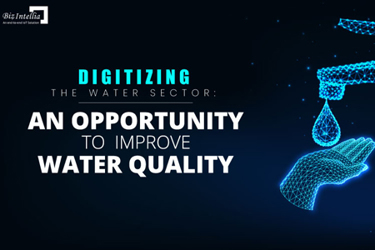Digitizing The Water Sector: An Opportunity To Improve Water Quality
By Sanjeev Verma

The greatest threats to our water supply can be overcome through the application of digital technologies, but widespread implementation remains a hurdle.
In today's world, where the population is increasing at a rapid pace, one in three people live without safe drinking water. By the end of 2050, up to 5.7 billion1 people will be residing in water-scarce areas. According to a report by McKinsey2, over half of the population is living in cities and urban growth will continue through 2050. So, you can imagine the constant rise in the demands of quality water for various purposes. It thus forces water systems to promote the importance of freshwater while making intelligent decisions and efforts to mitigate water scarcity as much as possible.
Digitization is one of the solutions that multiply opportunities and reduces water-related problems. Most industries are already undertaking the capabilities of the Internet of Things (IoT) and sensor systems. There is a consistent shift from traditional systems to smart systems, which have now become the growth drivers for industries like water, petroleum, and others. Smart water solutions cover most of the areas within cities, industries, etc., providing an improved quality of life with digital connections and operational efficiencies. The acceptance of IoT is leading to massive industrial profits, as Bain3 predicts IoT and analytics revenue will grow to $520 billion in 2021.
Adapting to the water effects of climate change promotes better health, saves lives, reduces the after-effects of natural disasters like floods and droughts, and teaches us to use water more efficiently. But this can be enhanced with the help of technologies like IoT.
- It helps erase the issues like water scarcity by analyzing the key components through data.
- The technology focuses on innovative solutions to support the areas lacking water.
- It consists of advanced analytics to keep a real-time check on water quality.
- Satellite data acquisition can be leveraged for real-time flood prediction.
- It optimizes smart resource management and improves communication/complaint-handling.
- It facilitates upgrades to aging infrastructure for better performance.
Digitization in the water sector leapfrogs traditional infrastructure to hybrid and latest systems, provisioning real-time information regarding water quantity and quality for consumers. There is a growing number of municipalities that are leading a digital transformation to improve outcomes. However, utilities are gradually targeting data-driven approaches for better sustainability.
It promotes the proper study of water consumption patterns and enables authorities to analyze water quality for safe usage. Let’s learn how digitization can help improve water quality.
How Digitization Through IoT Helps Improve Water Quality
Currently, billions of people living in water-stressed regions have no access to safe drinking water and are thus susceptible to life-threatening waterborne diseases.
In particular, urban areas (cities) are highly vulnerable to the after-effects of water scarcity. Also, due to climatic changes, water shortage could decrease GDP, cause migration, and create conflicts. Many global cities are realizing these impacts, and as a result are looking for smarter means to increase resiliency to changing hydrologic conditions. IoT provides such opportunity, while offering easy and efficient ways to monitor water quality.
1.Smart Water Meters
Monitoring water flow level through smart meters has become a necessity in today’s world, considering the massive waste caused by water leaks. An IoT-powered water meter allows you to monitor the flow, pressure, temperature, and other parameters within distribution pipelines. It allows real-time monitoring of the entire distribution system with the help of sensor-based technology. Moreover, it enables remote monitoring with its wireless feature, avoiding the hassle of visiting the sites every often. A smart water meter can also be scaled-up to monitor water quality before supplying it further.
2.Blockchain Applications
In contrast to more common techniques, blockchain technology with IoT efficiently resolves water distribution problems, mitigates the involved risks, and enables proactive monitoring of water management systems. It provides ongoing information to water organizations and government authorities for continuous insight on infrastructure, billing processes, and other prospects. Blockchain is used to obtain information and manage the status of water licenses, distributive networks, asset accessibility, etc. Water management blockchain offers quick and straightforward data, which can be utilized for analysis and improvements in the plans for effective consumption practices.
3.Smart Wastewater Treatment
With the help of IoT sensors, smart wastewater systems can fulfill the demands for water usage in cities. It helps in making intelligent decisions, detecting and preventing sewage overflows, and providing real-time information about water levels and quality. Also, utilities can predefine the threshold values, which provides alerts to take immediate actions.
Water is the bare necessity for our survival, and preserving it is our foremost responsibility. Using high-end technologies like IoT is one of the greatest assets to identity water consumption patterns and provide improved quality for consumers. Smart applicability to retain water quality also greatly helps in unforeseen situations like the current COVID pandemic. We could even say that most water-related answers can be found in automation — but only if we utilize the technology smartly.
 Sanjeev Verma is the founder and CEO of Biz4Group, based out of Orlando, FL. He has conceptualized the idea of Biz4 Brand and founded Biz4Group and Biz4Intellia. He has 20+ years of experience in boosting IT-based startups to success. In the past, he has worked on leadership positions with Marriott Vacations, Disney, MasterCard, State Farm, and Oracle. The company headed by him excels in developing, implementing, and monitoring digital solutions ranging from IoT solutions and products, mobile and web development, and digital marketing to full stack development and CMS solutions.
Sanjeev Verma is the founder and CEO of Biz4Group, based out of Orlando, FL. He has conceptualized the idea of Biz4 Brand and founded Biz4Group and Biz4Intellia. He has 20+ years of experience in boosting IT-based startups to success. In the past, he has worked on leadership positions with Marriott Vacations, Disney, MasterCard, State Farm, and Oracle. The company headed by him excels in developing, implementing, and monitoring digital solutions ranging from IoT solutions and products, mobile and web development, and digital marketing to full stack development and CMS solutions.
